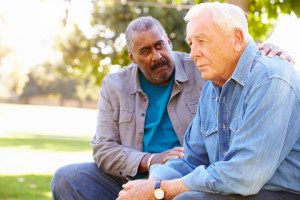 If you now find yourself or a loved one facing the end-of-life you may feel much confusion and ambivalence. Many people experience:
If you now find yourself or a loved one facing the end-of-life you may feel much confusion and ambivalence. Many people experience:
- Conflicted emotions
- Worry over pain, medical treatments and how to communicate wishes to your medical team.
- Overwhelmed by what action to take or not take
- Quality of life versus quantity of life questions
- Family disagreements about next steps
- Feelings of abandonment when loved ones inaccurately believe, to protect you, will not discuss this situation with you
- Wish to explore your thoughts and feelings about death but live in a death denying culture, family, religion…
- “It’s not fair!”
Other Normal Reactions to the News
Common reactions to the news of a life threatening illness may be a roar in the ears and it is not possible to hear anything else any one has to say. The Earth shifted on its axis and your whole world seems off kilter, at an awkward angle. Your emotions may be extremely tender and open as this news forces laser focus on what is most important to you. But then numbness descends as decisions, activities and the prospect of loss begins to overwhelm.
You may feel rage, panic and certainly not ready for the end of your life. You have not had enough time.
Concerns of leaving finances and possessions in order for loved ones may worry you.
There is Hope at End-of-Life
The end of your life or a loved one’s life can seem painful and chaotic. But it does not have to be. End-of-life can also be a poignant and unique time to connect with loved ones. It is also a time to find deeper meaning from your total life experiences. End-of-life counseling can decrease the paralysis and numbness you may experience by exploring your values, wishes and needs. Through this process you clarify what is important to you and how to communicate this importance to others.
There is so much to be overwhelmed with when doing end-of-life planning. To be able to talk out concerns with an objective person, not impacted by the consequences of your decisions, allow you to honestly explore your concerns and wishes in a safe environment.
You may be facing a loved one’s end of life and needing someone outside the circle of family and friends to explore your feelings. End of life counseling provides this space to speak without fear of burdening another.
End-of-life counseling is beneficial for considering aspects at this time you may not have considered. No one can fully prepare for all the emotional impact of this time. But to be prepared for financial, legal and other practical matters allows you to focus on what is most important to you, your loved ones.
Through end-of-life counseling you have the opportunity to:
- Express your grief through words and/or projects
- Clarify and state end of life needs
- Find meaning in one’s life and one’s death
- Explore and address “unfinished business”
- Ensure all arrangements have been considered
Complications Counseling Can Ease
Many people struggle with end-of-life planning. Family conflict may escalate at this time as old emotional wounds resurface. Strife over finances or treasured possessions may increase, as these discussions must now take place.
Many people avoid making any plans for the end-of-life since it can be very uncomfortable for us to face our mortality. When end-of-life is imminent and the subject can no longer be avoided it is quite common to feel overwhelmed with the legal, financial and other arrangements on top of the emotional impact of this news.
When overwhelmed you may fall back into old family roles and communication patterns. Through end of life counseling you give yourself the time and space to explore your needs and your family’s needs to determine a course of action you feel more confident to pursue.
You may feel end-of-life counseling could be useful for you right now but have some questions.
Can’t I just figure this out by downloading an end-of-life checklist from the Internet?
Sure, the Internet is a great resource for checklists to begin your end-of-life planning. But when feelings are overpowering, family disagreements occurring the checklists no longer serve to navigate you through these difficulties. Sometimes the checklist in itself can stun since there can be so much to consider. End-of-life counseling allows you to work at your pace, reduce the sense of overwhelm and make a difficult situation feel more manageable.
How will counseling help since nothing is going to take away the pain of this loss?
Loss is painful and counseling does not take away that pain. End-of-life counseling can help reduce regret though. Much pain associated with loss stems from regret. “Why didn’t I do that? Why didn’t I say this?”
Through counseling you can become clearer about your needs. This clarity can help you do or say what you feel is now needed. End-of-life counseling helps you avoid unnecessary pitfalls in an already painful situation.
Why pay for help I can get by talking to a friend?
Yes, a very good friend is so helpful during this time. But just like you pay a doctor for medical advice in an area you may not understand. It can be helpful to pay a professional experienced with the social and emotional aspects of end-of-life. Research demonstrates that the grieving process is eased for those who have fewer regrets and complications. Isn’t yours and your loved ones long-term emotional health worth investment by reducing regrets and complications?
How Can I Help
My background includes working in a hospice inpatient unit. Daily I worked with people at the end of their lives. I treated their families and facilitated several family meetings on how to navigate these final days. I also have years of experience working with people diagnosed with HIV and other chronic and terminal illnesses exploring the social and emotional issues confronted at the end of life.
My perspective and experience is also personal. I have lived long enough to be part of the decisions and pain of losing loved ones. My own brush with mortality being treated for cancer a few years ago gives me unique insight as a counselor.
If you are ready to take the next step towards end-of-life counseling download the free report, “Ten Benefits of Hospice: Put Aside Misconceptions.” Many people who sign up for hospice regret they did not sign up earlier and take advantage of the benefits sooner.
